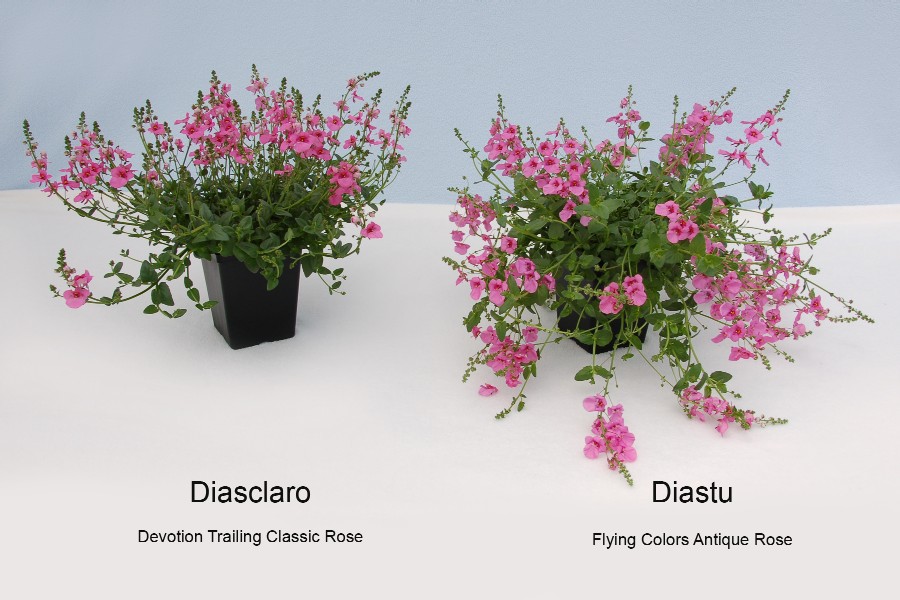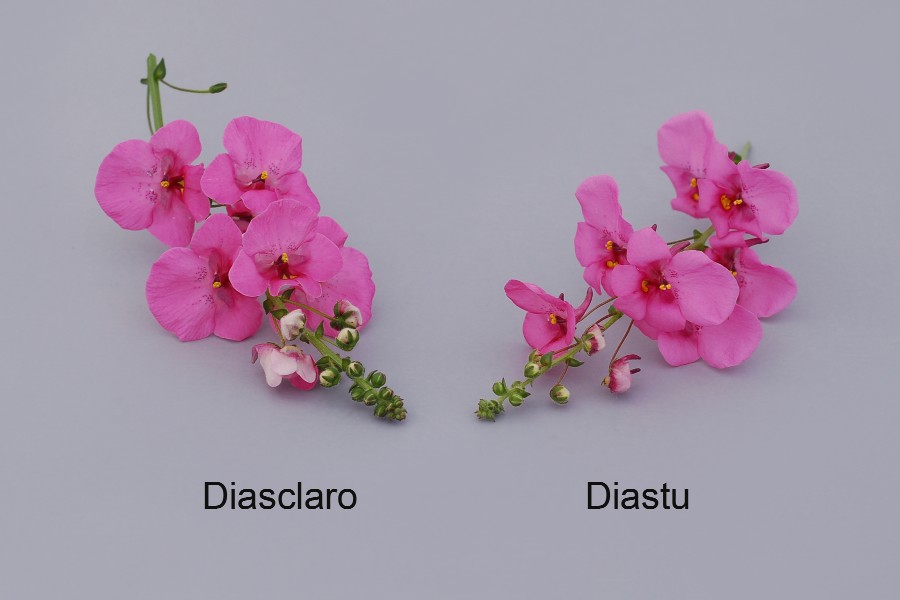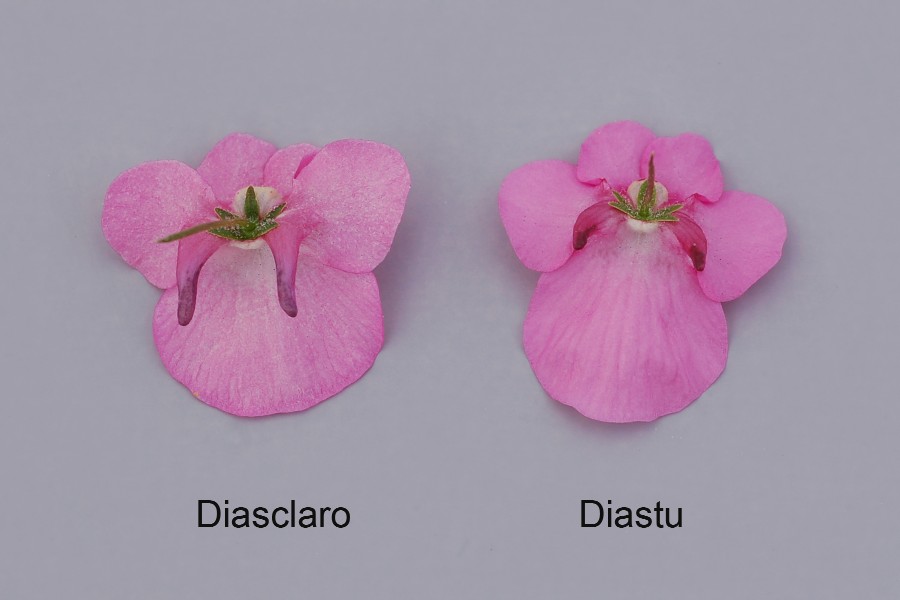Diasclaro
| Denomination: | 'Diasclaro' |
|---|---|
| Trade name: | Devotion Trailing Classic Rose |
| Botanical Name: | Diascia barberae |
| Applicant/Holder: |
Syngenta Crop Protection AG Rosentalstrasse 67 Basel CH-4058 Switzerland |
| Breeder: |
Har Stemkens, Syngenta Seeds B.V., Enkhuizen, Netherlands |
| Agent in Canada: |
BioFlora Inc. 38723 Fingal Line R.R. #1 St. Thomas, Ontario N5P 3S5 Canada Tel: 519-317-7511 |
| Application Date: | 2005-11-25 |
| Application Number: | 06-5650 |
| Date Withdrawn: | 2009-09-23 |
Variety Description
Variety used for comparison: 'Diastu' (Flying Colors Antique Rose)
Summary: The plants of 'Diasclaro' are smaller with a semi-upright growth habit while those of 'Diastu' are spreading. The corolla of 'Diasclaro' is shorter and wider than that of 'Diastu'. Incurving of the lower corolla lobe is medium to strong for 'Diasclaro' while it is absent for 'Diastu'. 'Diasclaro' has longer spurs than 'Diastu'.
Description:
PLANT: semi-upright growth habit, very short, narrow to medium width, dense
STEM: weak anthocyanin colouration below inflorescence
LEAF BLADE: medium to long, wide, acute apex, truncate to cordate base, medium to strong glossiness on upper side, no variegation, medium green on upper side
INFLORESCENCE: dense
PEDICEL: medium length, weak to moderate anthocyanin colouration
COROLLA: short to medium length, very wide, blue pink (RHS 68A-B) on upper side with lighter blue pink towards base of lower corolla lobe
LATERAL COROLLA LOBES: weak reflexing
LOWER COROLLA LOBE: broader than long, moderate to strong incurving, weak undulation of margin, trichomal elaiophores present
TRICHOMAL ELAIOPHORES: medium density
COROLLA WINDOW: dark yellow
COROLLA SPURS: medium length, blue pink (RHS 68B), weak curvature, pointing downwards
Origin & Breeding History: 'Diasclaro' originated from a controlled cross between the female parent designated 'B0015-5' and the male parent designated 'B0015-4' which was made in August 1999 by the breeder Har Stemkens, an employee of Syngenta Seeds B.V. in Enkhuizen, The Netherlands. 'Diasclaro' was selected from the resulting progeny in May 2000 based on its earliness to flower, plant form and flower colour. Asexual reproduction by cuttings was first conducted in July 2000 in Enkhuizen, The Netherlands.
Tests & Trials: Trials for 'Diasclaro' were conducted in a polyhouse during the spring of 2008 at BioFlora Inc. in St. Thomas, Ontario. There were 15 plants of each variety. All plants were grown from rooted cuttings and transplanted into 11.5 cm pots on March 18, 2008. Observations and measurements were taken from 10 plants or parts of plants of each variety on May 12, 2008. All colour determinations were made using the 2001 Royal Horticultural Society (RHS) Colour Chart.
Comparison tables for 'Diasclaro' with reference variety 'Diastu'
Plant height (cm)
| 'Diasclaro' | 'Diastu' | |
|---|---|---|
| mean | 19.3 | 22.2 |
| std. deviation | 2.74 | 2.20 |
Plant width (cm)
| 'Diasclaro' | 'Diastu' | |
|---|---|---|
| mean | 39.7 | 45.6 |
| std. deviation | 2.06 | 2.76 |
Corolla length (cm)
| 'Diasclaro' | 'Diastu' | |
|---|---|---|
| mean | 1.9 | 2.3 |
| std. deviation | 0.18 | 0.19 |
Corolla width (cm)
| 'Diasclaro' | 'Diastu' | |
|---|---|---|
| mean | 2.3 | 2.2 |
| std. deviation | 0.06 | 0.10 |
Click on image for larger view

Diascia: 'Diasclaro' (left) with reference variety 'Diastu' (right)
Click on image for larger view

Diascia: 'Diasclaro' (left) with reference variety 'Diastu' (right)
Click on image for larger view

Diascia: 'Diasclaro' (left) with reference variety 'Diastu' (right)
- Date modified: